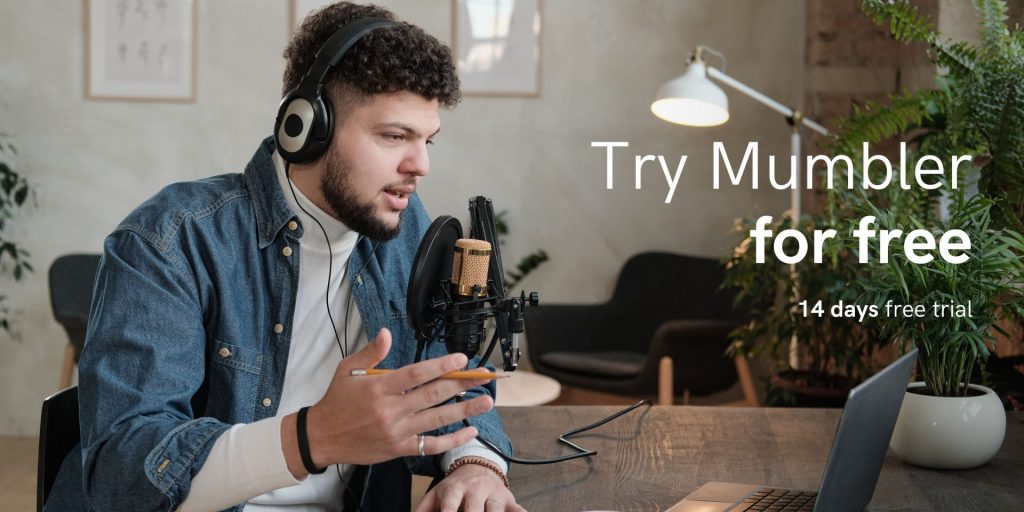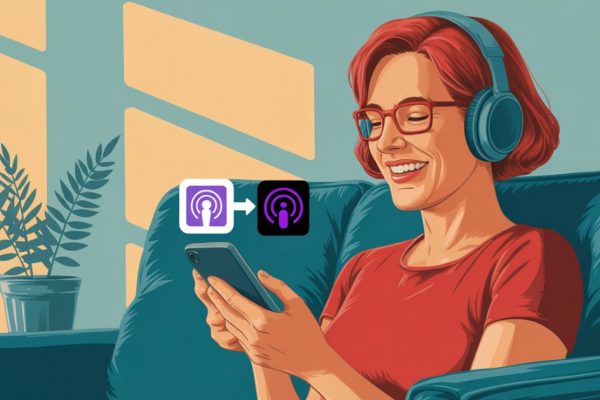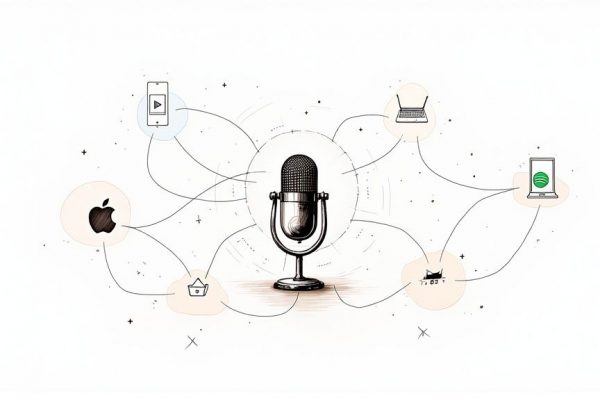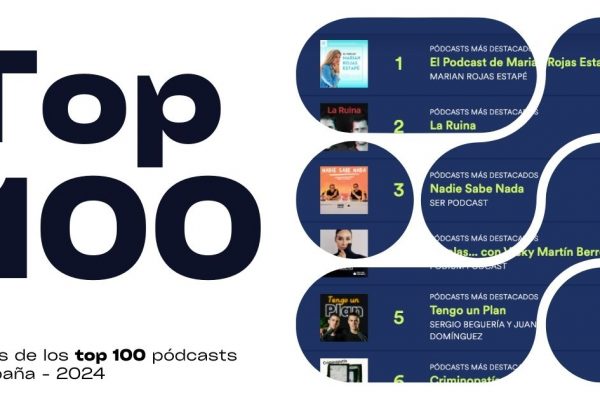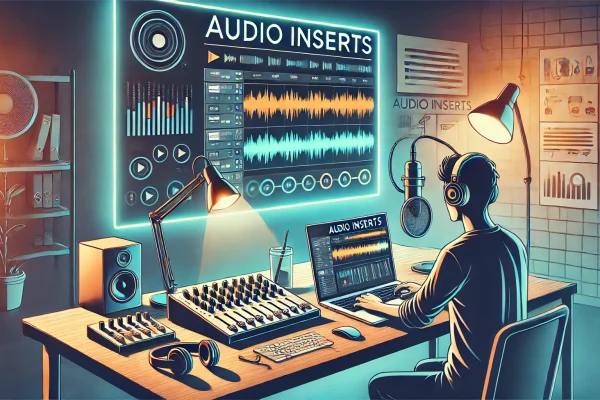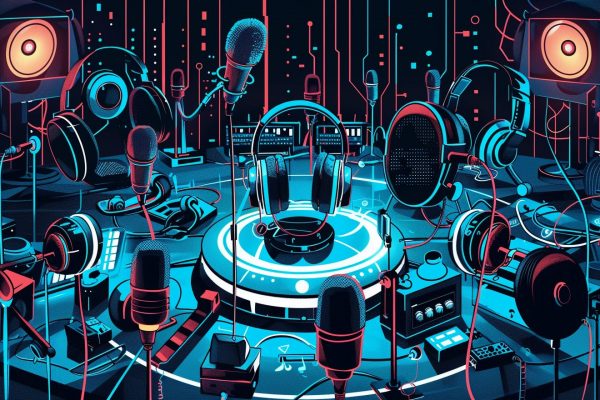Have you ever stopped to think about why people listen to podcasts?
While there is still a lot of audience to conquer, nowadays, this format has become a form of entertainment and learning. Growing in popularity among people of all ages.
These audio programs have captured millions of listeners worldwide, offering a wide range of topics and approaches that appeal to people with diverse interests.
In this article, we will explore the reasons why a person listens to podcasts and how this format has become a powerful tool for accessing quality content anytime and anywhere.
From the accessibility of podcasts to the diversity of available options, as well as the flexibility to fit different schedules and the quality of audio and information contained in episodes, each point brings us closer to understanding the appeal of this form of communication.
Additionally, we will explore the educational benefits that many podcasts offer and the personal intimacy that the format generates, creating a special connection between creators and the audience.
Finally, we will discover how the podcasting community shares opinions and good content, creating an interactive and collaborative space that drives the spread of ideas and the growth of the format.
Let's discover together why millions of people have found in them an endless source of knowledge, entertainment, and connection.

Accessibility of Podcasts
Podcasts have gained significant popularity due to their accessibility.
Listeners can access a wide variety of content from different platforms and devices, such as mobile phones, tablets, and computers.
This ease of access allows users to enjoy their favorite podcasts at any time and place, whether at home, while exercising, or even while using public transportation.
Unlike other forms of media, podcasts do not require the listener to be connected to the internet in real-time to enjoy the content.
Once the episode is downloaded or added to a playlist, users can listen without interruptions, even in areas with low or no internet connectivity.
Furthermore, most applications and platforms where a person listens to podcasts offer the option of subscribing and automatically downloading new episodes.
This enables listeners to stay up to date with their favorite shows without having to worry about manually searching for and downloading each episode.
Automation and offline availability offline make podcasts a convenient choice for users who want easy and hassle-free access to the content they consume.
Another essential aspect of podcast accessibility is the diversity of platforms that support them.
Whether through dedicated podcast apps, media players, or streaming services, listeners have a wide range of options to choose from. amplia variedad de opciones para elegir.
This availability on multiple platforms allows creators to reach a broader audience, and listeners to access content from their preferred devices.
In summary, podcast accessibility is one of the primary reasons people listen to podcasts..
The ability to access a wide variety of content anytime and anywhere, along with the ease of downloading and subscribing, makes podcasts a convenient and appealing way to consume audio or video content.
Varied Options for All Interests
The diversity of available podcasts is limitless.
There are programs that cover a wide range of interests, from educational topics, news, entertainment, to sports, music, and much more.
This wide variety of options ensures that listeners can find content that suits their personal preferences and discover new topics that pique their interest.
Podcasts have become a means of expression for a broad community of creators, allowing them to share their knowledge, experiences, and passions with a global audience. compartir sus conocimientos, experiencias y pasiones con una audiencia global.
Whether someone is interested in learning about ancient history, improving their cooking skills, staying up to date with the latest news, or simply enjoying a good story, there will always be a podcast to meet their needs.
Moreover, many podcasts focus on specific niches, offering the opportunity to delve into specialized subjects that may not have space in traditional media.
Listeners can immerse themselves in scientific debates, explore the world of contemporary art, discover new technological trends, or delve into foreign cultures, all through the unique perspective of podcast creators dedicated to these topics.
This variety of options also makes podcasts a valuable tool for education and personal development.
Students can access free and enriching educational content to complement their studies, while professionals can enhance their skills and knowledge in various areas thanks to experts and professionals featured on podcasts.
In summary, the diversity of options that podcasts offer is one of the key reasons why people listen to them.
The wide range of topics and approaches ensures that there is always something for every listener, making podcasts an endless source of entertainment, learning, and personal enrichment.
Flexibility to listen at different times of the day
One of the most significant advantages of podcasts is their flexibility.
Listeners are not limited to a specific schedule to enjoy the content, as is the case with radio or television.
They can listen to episodes at any time of the day, allowing for an entertainment or learning experience that fits into their individual routines and schedules.
In the current digital age, where time is a precious resource, podcasts offer an ideal alternative for consuming content without disrupting daily activities.
Listeners can enjoy a podcast while exercising, doing household chores, waiting for public transportation, traveling, or during a break.
Flexibility also allows listeners to manage their time efficiently.
They can pause and resume episodes at any time, enabling them to divide the content into smaller segments and consume it at their own pace.
This is especially useful for those with busy schedules, as they can continue listening from where they left off without missing essential details.
Moreover, most podcast platforms offer download and streaming features, meaning that listeners can choose to listen online or download episodes for offline listening when they don't have internet access.
This offline option offline is particularly beneficial during travels when connectivity may be limited or costly.
Flexibility also benefits educational content, as students and professionals can utilize downtime to listen to podcasts on topics of interest or related to their field of study or work.
This allows them to make the most of their free time and stay updated on the latest developments in their field.
As a result, flexibility at different times of the day is a key feature that attracts people to podcasts.
The ability to tailor content consumption to individual schedules and activities provides a more personalized and convenient experience for listeners, making podcasts a preferred choice for entertainment and learning anytime and anywhere.
Audio quality and information contained in episodes
Podcast creators often strive to deliver high-quality production and content in each episode.
The use of advanced recording equipment and careful editing ensures a pleasant listening experience..
Additionally, many podcasts feature experts and professionals who provide valuable information and enriching perspectives on various topics, enhancing the listener's experience.
Audio quality is a fundamental aspect for the success of a podcast.
Listeners value clear and crisp sound, which improves comprehension and enjoyment of the content.
Creators often invest time and resources in improving audio quality,using high-end microphones, professional editing software, and production techniques to eliminate disruptive noises and enhance the acoustics of episodes.
However, it's worth noting that there are exceptions to this rule, and thanks to the power of this format, even a podcast with poor sound quality can become successful and popular.
In addition to audio quality, another important factor is the information contained in the episodes.
Podcasts offer a unique opportunity to delve into specific topics with details and analysis not always found in other media.
Creators can dedicate time to research and gather relevant information, resulting in informative and enriching episodes for listeners.
Podcasts also allow the involvement of experts and professionals in various fields.
Whether through interviews, debates, or specialized comments, creators can provide listeners with deeper insights and unique perspectives on topics of interest.
This increases the value of the content and attracts audiences seeking reliable and high-quality information.
Furthermore, podcasts are characterized by their narrative and conversational format, making it easier to present information in an accessible and engaging manner.
Presenters can use examples, anecdotes, and case studies to illustrate complex concepts and make the content more enjoyable and understandable.
In summary, audio quality and the information contained in episodes are two key elements that make podcasts attractive and why people listen to them.
The combination of careful production with valuable and enriching information creates a rewarding and educational listening experience for audiences, making podcasts a preferred choice for those seeking quality content and informative entertainment.
Educational benefits offered by many podcasts
Podcasts not only provide entertainment but also hold significant educational value.
There are programs dedicated to teaching and disseminating knowledge in areas such as science, history, technology, entrepreneurship, and much more.
Listeners can learn in an engaging and accessible manner, making podcasts a valuable tool for continuous learning..
Educational podcasts are often hosted by experts and professionals in their respective fields.
These presenters possess extensive knowledge and experience in the topics they address, ensuring that the information provided is accurate and reliable.
This combination of knowledge and the podcast format makes high-quality educational content accessible to a broad and diverse audience.
Furthermore, podcasts offer a more relaxed and reflective pace compared to other media, allowing listeners to absorb information more effectively.
By being able to stop, pause, and replay episodes, listeners can process and understand complex concepts at their own pace, free from time pressure and visual distractions that may be present in other media, such as videos or visual presentations.
Educational podcasts also enable a more personalized experience.
Listeners can choose topics that interest them and delve into them according to their needs and interests.
Intimacy and personal connection generated by the format
Podcasts create a sense of closeness and connection with the listeners.
By hearing the voices of the presenters or interviewees, a more intimate and personal relationship with the content is established.
This allows listeners to feel like they are part of a community and develop loyalty to their favorite podcasts, which in turn fosters continued engagement with the content.
The audio format enables creators to express themselves authentically and naturally, generating empathy and connection with the audience.
Listeners can feel like they are having a conversation with the presenters, creating a more immersive and rewarding experience compared to other, more formal and distant media.
Moreover, podcasts often address personal topics, experiences, or opinions of the presenters, providing listeners with a deeper and more human understanding of the people behind the content.
This openness and transparency foster an emotional connection between creators and their audience, creating a sense of camaraderie and belonging to a community of listeners.
The intimacy and personal connection generated by the podcast format also encourage increased interaction with the audience.
People who listen to podcasts often send comments, questions, and suggestions to the presenters, and many programs include segments dedicated to addressing them.
This two-way interaction strengthens the bonds between creators and listeners, creating a more collaborative and participatory experience.
As detailed, podcasts offer valuable educational benefits by providing high-quality content in various fields of knowledge.
Furthermore, the audio format creates an intimate and personal connection between creators and the audience, fostering loyalty and engagement from listeners with the content is established.
These aspects make podcasts an appealing choice for those seeking accessible learning and emotional connection with the content they consume.

Sharing opinions and quality content within the podcating community
The podcasting community of listeners and creators is active and engaged.
Listeners often share their opinions about episodes and content through social media, forums, and comment platforms.
This interaction promotes a culture of feedback and collaboration, where the discovery of new podcasts is encouraged, and recommendations of interesting content are shared among community members.
Listeners find in podcasts a space to express their ideas and opinions on specific topics.
Through online comments and discussions, they can share their perspectives and enrich the discussion about the subjects addressed in the episodes.
This active participation creates a sense of community and shared interests, where listeners feel part of a group with common passions.
Furthermore, many podcasts feature sections for questions and answers or segments dedicated to audience opinions.
Creators often encourage listener participation by responding to their questions and comments in subsequent episodes.
This interaction creates a close bond between presenters and the audience, generating a sense of connection and reciprocity.
The podcasting community also shares quality content among its members.
Listeners recommend their favorite podcasts to friends, family, and social media followers. This word-of-mouth form of promotion is valuable for creators as it helps them reach new audiences and grows their listener base organically.
Furthermore, podcast creators collaborate with one another,appearing as guests on different shows or working on joint projects.
These collaborations promote the exchange of ideas and diverse perspectives, enriching the content offered to the audience.
The podcasting community is also a space where creators can receive This quality feedback and support to improve their content.
Feedback and suggestions from the audience help creators identify areas for improvement and create more relevant and engaging content for their audience.
In summary, the podcasting community is a place where opinions and quality content are actively and collaboratively shared.
The interaction between listeners and creators fosters a culture of participation and feedback, where everyone can contribute to the improvement and spread of the content they are passionate about.
This united and committed community is one of the most valuable and rewarding aspects of the podcasting experience.
So, why do people listen to podcasts?
Podcasts have captured the hearts and ears of a global audience, thanks to a range of irresistible attributes.
Their accessibility, allowing listeners to enjoy diverse content at any time and place, has fueled their popularity.
Additionally, the wide diversity of topics and approaches has attracted listeners with varied interests, offering them an educational and enriching experience.
The flexibility to listen at different times of the day has become a perfect ally for those with busy lifestyles.
The audio quality and the information contained in episodes have enriched the listening experience and allowed creators to connect with an audience eager for knowledge and entertainment.
Similarly, the intimacy and personal connection generated by the format have created a community of engaged and loyal listeners, strengthening the relationship between creators and their followers.
Lastly, the podcasting community has proven to be a space for interaction and collaboration, where opinions and quality content are actively shared, fostering a culture of participation and continuous learning.
In conclusion, podcasts have become a powerful tool for entertainment, education, and personal connection, and their impact on current society has transformed how we access information and relate to the community.
Undoubtedly, this format will continue to enrich our lives and offer us a world of knowledge at the click of a button.
So, what do you think is the main reason why people listen to podcasts?
About the author
Content Manager at Mumbler.
Podcaster and content creator.
Passionate about communication and a fan of the WordPress community.
I talk about movies and series on Babel Infinito.
I talk about podcasting on Todo por Un Podcast.

